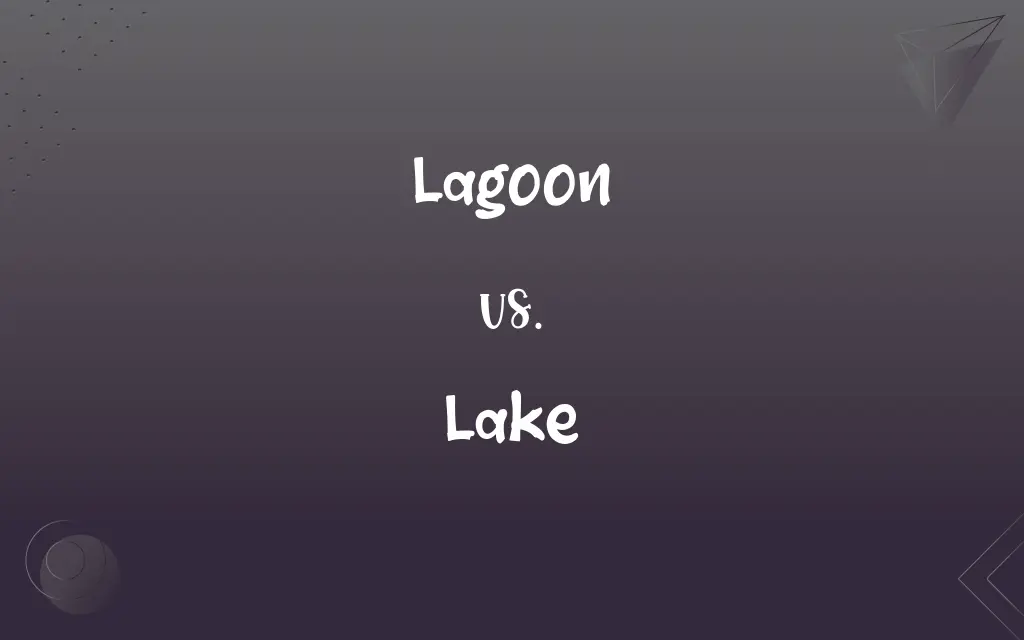Lagoon vs. Lake: What's the Difference?
Edited by Aimie Carlson || By Harlon Moss || Updated on October 10, 2023
A lagoon is a shallow body of water separated from a larger body of water by a barrier, while a lake is an inland body of water, typically freshwater, formed by geological activities or glaciation.

Key Differences
Lagoon, by definition, commonly refers to a shallow body of water that is separated from a sea or ocean by a barrier such as a sandbar or a barrier island. In contrast, a lake generally signifies a sizable inland body of standing water which can be either freshwater or saline.
In terms of formation, lagoons are often formed through processes like sedimentation and occur along coastal areas. On the contrary, lakes can be formed through various geological processes like tectonic plate movements, glacial activities, and volcanic eruptions, which can occur in various locales.
Ecologically, a lagoon often demonstrates a brackish water quality due to its connection with the sea or ocean, harboring a unique set of flora and fauna. Comparatively, a lake, especially a freshwater lake, will sustain a different ecosystem, usually removed from the influences of marine environments.
Utilization of a lagoon often leans towards activities that are adapted to its shallower and often calmer waters, such as certain types of fishing or bird-watching. Whereas a lake, due to its potential depth and expanse, might be employed for a range of activities from boating to various water sports.
Lagoons, given their coastal nature, might be particularly affected by tides, often having fluctuating water levels. In contrast, lakes, being inland, are generally not subject to tidal influence, but their water levels can be affected by factors like rainfall and inflow from tributaries.
ADVERTISEMENT
Comparison Chart
Definition
Shallow, near-coastal
Inland, sizable
Formation
Often through sedimentation
Various, including tectonic, glacial
Water Type
Typically brackish
Freshwater or saline
Typical Activities
Fishing, bird-watching
Boating, water sports
Influences on Level
Affected by tides
Influenced by rainfall, tributaries
ADVERTISEMENT
Lagoon and Lake Definitions
Lagoon
A lagoon’s ecology may include various marine and freshwater species.
The lagoon, teeming with life, showcased nature’s adaptability.
Lake
Lakes may vary greatly in size, from small ponds to vast expanses.
The vast lake unfurled beyond the horizon, a freshwater sea.
Lagoon
A lagoon is a coastal water body separated from larger waters by a physical barrier.
The azure lagoon was calm, protected from the ocean’s fury.
Lake
A lake's ecosystem is commonly isolated from oceanic influences.
The lake, undisturbed by tides, nurtured a distinct aquatic life.
Lagoon
Lagoons often feature brackish water, combining freshwater and saltwater elements.
Flamingos gracefully traversed the brackish lagoon.
Lake
Lakes can be sites of recreational activities and natural habitats.
Campers gathered by the lake, enchanted by its placid beauty.
Lagoon
Lagoons typically form parallel to coastlines, creating tranquil environments.
We picnicked beside a tranquil lagoon, sheltered from the coastal winds.
Lake
A lake is a substantial inland water body, typically holding freshwater.
The serene lake, nestled between mountains, mirrored the sky.
Lagoon
Lagoons can be tidal, with water levels influenced by the sea’s movements.
Observing the lagoon, the researcher noted the subtle shifts with the tides.
Lake
Lakes can form via diverse geological processes, such as glaciation.
The glacial lake shimmered, bearing the legacy of ancient ice flows.
Lagoon
A shallow sound, channel, pond, or lake, especially one into which the sea flows; as, the lagoons of Venice.
Lake
A large inland body of fresh water or salt water.
Lagoon
A shallow body of water, especially one separated from a sea by sandbars or coral reefs.
Lagoon
A shallow artificial pond used for treating or storing liquid waste material or for collecting flood waters.
Lagoon
A shallow body of water separated from deeper sea by a bar.
Lagoon
A lake in a coral island, often occupying a large portion of its area, and usually communicating with the sea. See Atoll.
Lagoon
A body of water cut off from a larger body by a reef of sand or coral
FAQs
What defines a lagoon?
A lagoon is typically a shallow coastal water body separated from a larger body of water by a barrier.
How are lagoons formed?
Lagoons often form through sedimentation along coastlines, separated from larger waters by barriers like sandbars.
Are lagoons affected by tides?
Yes, lagoons, due to their connection with larger water bodies, can be influenced by tidal movements.
What types of activities are common in lagoons?
Activities like bird-watching and specific types of fishing are often associated with lagoons due to their calm and shallow waters.
How does a lake form?
Lakes can form through various geological means like tectonic movements, glacial activities, and volcanic processes.
What kind of water does a lagoon typically have?
Lagoons generally feature brackish water, a mix of fresh and saltwater, due to their proximity to larger water bodies.
How does water leave a lake?
Lakes lose water through outlets like rivers or streams, through evaporation, or via groundwater seepage.
Do lakes experience tidal changes?
Generally no, lakes, being inland and isolated from seas and oceans, do not experience tides.
Are lagoons fresh or saltwater bodies?
Lagoons are typically brackish, containing a mixture of fresh and saltwater, due to their connection to the sea.
Can lagoons be used for transport?
Lagoons, typically being shallow, are not commonly used for transport but can be navigated using small boats.
What can you do on a lake?
Lakes often support a variety of activities like boating, fishing, and other water sports due to their potential depth and expanse.
What ecosystems are typical in lagoons?
Lagoon ecosystems are often brackish, supporting both freshwater and marine species, and are biodiverse.
Are lakes typically found near coasts?
Lakes are inland water bodies and can be found in various environments, far from coasts.
Are lakes used for transport?
Yes, some large lakes can serve as waterways for transport using ships and boats, facilitating trade and travel.
How is a lake characterized?
A lake is an inland body of standing water, which can be fresh or saline, and is typically sizable.
What kind of water is found in lakes?
Lakes can contain either freshwater or saline water and are usually isolated from oceanic influences.
How does the ecosystem of a lake look like?
Lake ecosystems typically support a range of aquatic life, plants, and sometimes, depending on the size, varied microclimates.
Can lagoons be found inland?
While typical lagoons are coastal, some lagoons, often formed by different processes, can be found inland.
How does water leave a lagoon?
Lagoons can exchange water with the sea or ocean through inlets in their barriers, and also via evaporation.
Are lakes freshwater bodies?
Lakes can be freshwater bodies, but there are also many saline lakes, depending on their geological formation and location.
About Author
Written by
Harlon MossHarlon is a seasoned quality moderator and accomplished content writer for Difference Wiki. An alumnus of the prestigious University of California, he earned his degree in Computer Science. Leveraging his academic background, Harlon brings a meticulous and informed perspective to his work, ensuring content accuracy and excellence.
Edited by
Aimie CarlsonAimie Carlson, holding a master's degree in English literature, is a fervent English language enthusiast. She lends her writing talents to Difference Wiki, a prominent website that specializes in comparisons, offering readers insightful analyses that both captivate and inform.































































